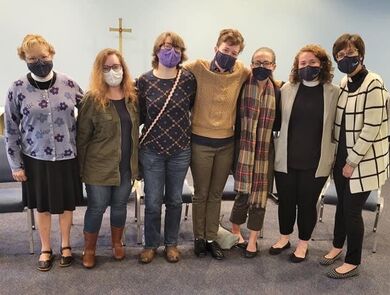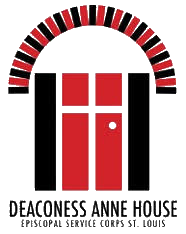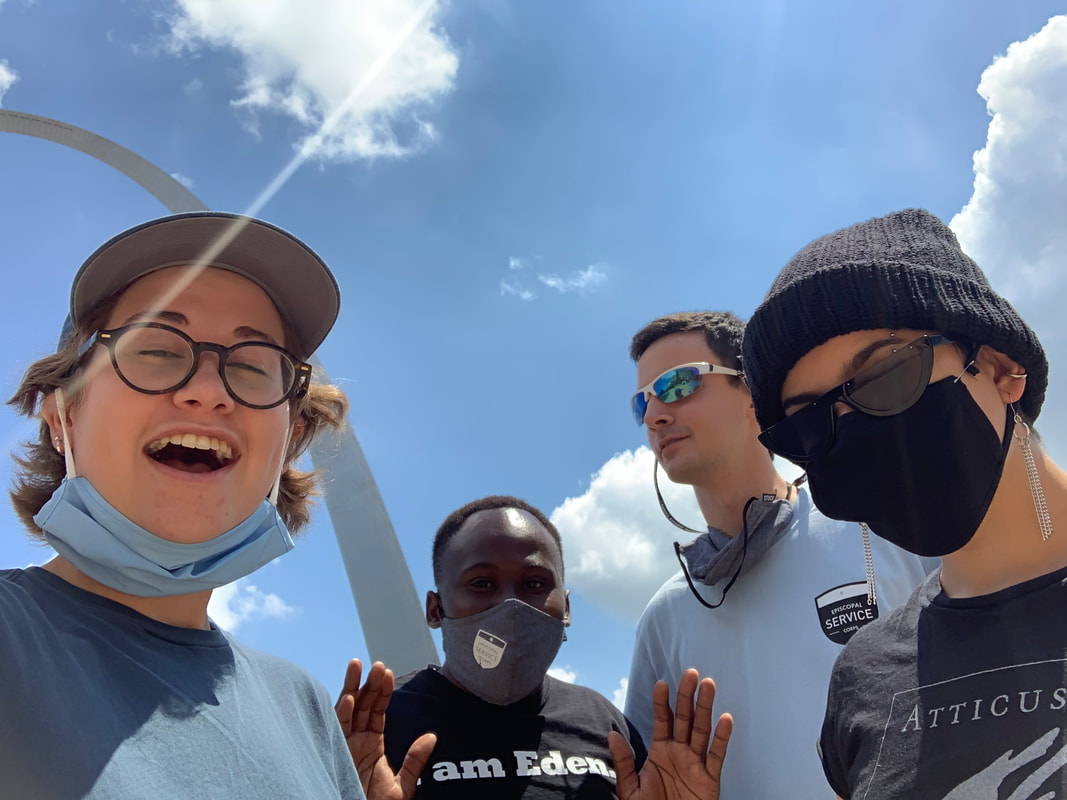 Sermon by Corps Member Megan Oakes (middle) on Mark 10:46-52 from October 24, 2021 at St. Barnabas Episcopal Church in Florissant, MO. In today’s Gospel, Bartimaeus, a blind beggar, is sitting on the side of the road when Jesus, his disciples, and a huge crowd pass by. Once Bartimaeus finds out that the reason for the crowd is Jesus, he immediately, urgently begins to cry out to him, shouting “Jesus, son of David, have mercy on me!” The immediacy of Bartimaeus’s shout creates an intense display of vulnerability for everyone watching. He can’t see Jesus, but Bartimaeus calls out to him, raising his voice to a man who he is identifying as the son of David. This identification of Jesus as the son of David is connected to the legacy of kings, and identifies Jesus as the fulfilment of the prophecy in the book of Samuel that proclaimed that a descendant of David would establish the Kingdom of God, and that this descendent would rule forever. And Bartimaeus is daring to cry out to this Lord, from the side of the road, in the midst of a chaotic procession out of Jericho toward Jerusalem. Not only does Bartimaeus call out to Jesus and name exactly who he is, he also asks Jesus for mercy, recognizing his own need and crying out to Jesus for help. And because of this disruption, the crowd tries to silence him. I wonder why those walking alongside Jesus ordered Bartimaeus to be quiet, to not speak to Christ. After all, those following Jesus were not very likely to be that much more well off than Bartimaeus in many ways - they would have been a motley crew of ordinary people, living under an oppressive empire, and suffering their own experiences of marginalization, even though they presumably were able to see, and because of that ability, able to walk with Jesus instead of begging by the road. They *should* have been able to emphasize with Bartimaeus, because really, why would they be following Jesus if they weren’t also looking to be healed? How could they not see Bartimaeus’s need for healing as intrinsically connected to their own? And yet, the crowd’s immediate reaction was to hush Bartimaeus, preferring not to make a scene, preferring to keep everything in order, and to make sure Jesus could do what they thought he was supposed to. I think that those in the crowd may have been confronted, through Bartimaeus’s cry to Jesus, with their own reluctance to ask for healing for themselves, and with their own fear of rejection by Jesus from that healing. Bartimaeus’s disruption made those in the crowd aware of their own needs, but rather than also asking for healing and mercy, the crowd silenced him. They had been following Jesus, but they themselves likely had not had the intimacy with him that Bartimaeus is asking for in crying out directly to Christ. Bartimaeus’s disruption makes them all “look bad,” that is, look like they too might be in need of healing, like their own brokenness might have to be on display like his is. To me, this desire to hide any potential wounds rings true to my own experience. As much as I want to try to fix everything and make everything safe for other people and to talk big game about mutuality and care, I tense up when I need to ask for help for myself, or when someone assumes that I need help that I think I could get by without. I don’t think I ever could have had the bravery of Bartimaeus to cry out to Jesus for healing. I would have been too busy convincing myself that someone else deserved it more. At the beginning of covid, I lost my job at school, and was placed in a tough financial place on a few fronts. I was incredibly stressed, and debating on if I should move back in with my parents to save on bills, even though my lease wasn’t over. I mentioned this to the priest at my church, and he offered me a paid position doing work as a sacristan, a position I had already been talking to him about taking for free. I needed that job, and yet, every single part of me wanted to refuse it. After many conversations, I accepted the job, and am still so thankful for it, as it allowed me to stay in Seattle until I could find another job that summer. Having the stability working as a sacristan provided me helped me to stay in community with the people I cared about, helped me to finish school, and took a ton of stress off my shoulders. And there is still a nagging voice in my head that tells me that the funds used to pay me could have been better used for another project, for another member, for someone else who had it worse than I did. We create this same separation in our own lives as the crowd tried to create with Bartimaeus, categorizing some as those that need healed, and some as those who are better, who don’t have the same need for this healing. Even though it may be viewed as coming from a place of selflessness, of giving, this dividing up of ourselves as givers and receivers results in an understanding of the world that split us into useful and useless, whole and broken, good and evil. It creates power dynamics that only serve to drive us farther away from God and from each other. And it causes all of us to seek to deny our needs, our own hurt and brokenness, and through this denial, to deny the needs of others. And how does this desire to separate worth from unworthy result in the silencing of those who are brave enough to cry out for help? Our entire society is set up to silence. It’s set up to make sure that those who receive help are only those who are “really worthy” of it, with the goal of making sure that anyone who may not quite need the help doesn’t get it. This goal of silencing prevents many who need help from getting it, and prioritizes a false idea of worthiness over basic human dignity. At the food pantry within the youth and family center, where I’m serving this year, one of the items that leaves our shelves the fastest is dish soap. Dish soap isn’t needed for survival, yet many people will ask for dish soap, toilet paper, paper towels, and other cleaning products before they even look at the food we have. Toothpaste, toothbrushes, soap – same thing. The reason for this is that none of these products are covered by food stamps. Since the government says that toiletries and cleaning supplies aren’t needed for survival, they aren’t seen as worthy of government funding, even though they are just as important for day to day living. And so our center tries to fill in the gaps, gaps that have been left because our society has collectively decided that it is better to prevent anyone from getting too much, from being too comfortable, than to ensure lives of dignity for everyone. Just as the voice of Bartimaeus was seen as a distraction and not worthy of being heard by the crowd, so are the needs of the marginalized in our own society seen as a frivolous distraction, too unimportant for the busy decision makers of our world to pause, and listen to, and work to change. In our society’s categorizing of some needs as real, and others as frivolous, we have created entire structures of silencing. When Jesus hears this disruption, he doesn’t ignore it, doesn’t tell Bartimaeus off, and doesn’t tell the crowd off either. The gospel says that he stands still, and tells those around him to call Bartimaeus over. He focuses his attention onto Bartimaeus, stopping his journey out of Jericho, stopping an entire crowd of people for the sake of one person who had the boldness to ask for healing. And suddenly, the whole tone changes. The people surrounding Bartimaeus tell him to take heart, and encourage him as he rushes over. Because of Jesus’s pause, the whole crowd turns its attention from the next thing to do to the man suffering right in front of them, right their with them in their midst. When Jesus speaks to Bartimaeus, he doesn’t immediately heal him. Instead, he first asks him exactly what he needs, what he wants from him. And Bartimaeus, continuing his boldness and his openness, tells Jesus that he wants to see again. No frills, nothing extra, just one simple, impossible request. And Jesus does it. Bartimaeus regains his sight almost immediately after asking to be healed. And then he joins the crowd surrounding Jesus, and follows him, out of Jericho, on to continue with Jesus on his mission of healing and liberation. The first action after the gift of healing is to go follow the healer. Bartimaeus immediately takes the action to walk with the one he named as the messiah. The first act after an individual is healed is to work towards a healed community. If the crowd had its way, and Bartimaeus had not been brave enough to keep crying out, what would have happened? They would have walked on, passing him by, leaving Bartimaeus suffering, and the crowd secure in their belief that they had prevented a problem person, a person seen as a bother, from interfering with Jesus’s mission. They would have walked on, leaving a part of their community behind in Bartimaeus, sitting on the road. But they didn’t. Bartimaeus kept crying out, and Jesus heard him, and healed him. And the body of Christ forming around Christ found another part of itself. Bartimaeus’s bravery in crying out for help, and his bravery in knowing his own need, helped reveal the Kingdom of God for the crowd that was following Jesus, and for those of us who hear this story now. Jesus’s healing of Bartimaeus is a miracle, but so too is the conversation they have before. A conversation where the son of God pauses, and hears the cry of the marginalized among the marginalized. A conversation where the need of one man takes priority over any other more efficient, utilitarian ways of solving the problems of the world. A conversation where an omniscient God asks what a suffering man needs and wants, rather than acts without relationship. A conversation where we see the dynamics of the kingdom of God at play. If we really recognize and proclaim Christ’s healing message to the world, that requires us to also open ourselves up to that healing for ourselves. We cannot proclaim Christ’s healing for others without recognizing our own brokenness, and we cannot begin to heal ourselves without healing others. Whether we like it or not, we are connected to each other, and proclaiming the gospel means living into that truth. It means that instead of coming forward with solutions, we, like Jesus, come forward with questions, asking what those we serve want us to do. It means that, like Bartimaeus, we see our own needs, and cry out for them, trusting that God values our dignity, and that there is abundance enough that everyone can live a life of dignity, even if our world denies it. It means that we denounce the structures that separate us from our siblings in Christ, and refuse to accept the lie that there is not enough for everyone, that some needs must be sacrificed for our society to run. And it means that, like the crowd, once we hear Jesus’s invitation of healing, we cease our own silencing behaviors, and start encouraging each other to cry out for help, from God and from each other.
1 Comment
|
Categories |
|
Mailing address:
DAH c/o Diocese of Missouri 1210 Locust St. Louis, MO 63103 |
(c) 2014 - 2020 Episcopal Diocese of Missouri
|


 RSS Feed
RSS Feed